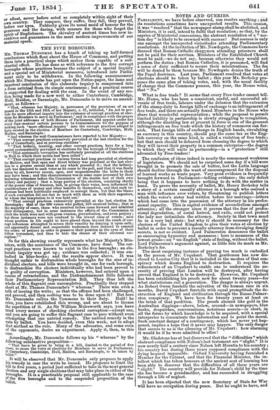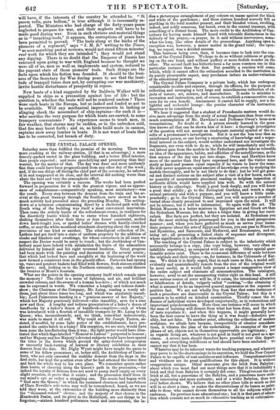NOTES IND QUERIES.
PememENT, we have before observed, can resolve anything ; and its resolutions sometimes have unexpected results. This session, it was "resolved" that the newspaper-stamp shall be abolished, and Ministers it is said, intend to fulfil that resolution ; so that, by the caprice Ministers, concessions, the abstract resolution of a " mo-
tion day " is likely to be crowned with success ! But success is only one amongst the unexpected vicissitudes attending Parliamentary resolutions. At the invitation of Mr. Newdegate, the Commons have decreed that Roman Catholic clergymen attending prisoners shall not be paid for their services. Ministers of the Established Church must be paid—we do not say, because otherwise they would not perform the duties • but Roman Catholics, it is :presumed, will find a sense of duty sufficient to secure their ministrations. The fee will be denied to them because Mr. Newdegate denies the truth of the Papal doctrines. Last year, Parliament resolved that votes at elections should be taken by ballot ; this year Mr. Berkeley pro- poses the same plan of taking votes, and, with the usual facility of change that the Commons possess, this year, the House votes, that "No."
What is free trade ? It seems that every Free-trader cannot tell. Mr. Hume who has been a consistent, useful, and successful ad- vocate of free trade, labours under the delusion that the extension of the stamp-duty to foreign bills of exchange is an infringement of free trade, and there are actually found Members in the House who share that wonderful representation; while the proposal to permit limited liability in partnership is slowly struggling to recognition, although the disabling law at present in force is one of the grossest infringements on free trade which the history of commerce can fur- nish. That foreign bills of exchange in English hands, circulating as currency in this country, should pay the same tax as the Eng- lish currency on the same kind, is called a violation of free trade ; but that men should be debarred from choosing the degree to which they will invest their property in a common enterprise—the degree to which they will unite in partnership—is a " protection " still advocated by Free-traders !
The confusion of ideas indeed is nearly the commonest weakness of legislators. We should not be surprised some day if a bill were brought in to promote the sale of butter, lest the Latin language should decline through the want of encouragement for the disposal of learned works as waste paper. Very good evidence is frequently brought forward in Parliament—telling evidence ; the only defect being that it happens to have nothing to do with the matter in hand. To prove the necessity of ballot, Mr. Henry Berkeley tells a story of a certain rascally attorney in a borough who coerced a man with influence over voters, by threatening to publish letters which the voter's sister had written before her marriage—letters which had come into the possession of the attorney in his profes- sional capacity. This is capital evidence of seoundrelism amongst attornies ; all the stronger since it proves, that the fear of profes- sional degradation, of social hatred, and exile' could not protect the lady nor intimidate the attorney. Society in that town must be in a very bad state : but why it should be necessary for the electors of the 'United Kingdom to give their votes at election by ballot in order to prevent a rascally attorney from divulging family secrets, is not so evident. Lord Palmerston denounces the ballot as encouraging hypocrisy and meanness : here is meanness of the lowest grade—an " un-English" state of feeling, without the ballot. Lord Palmerston's argument against, as little hits its mark as Mr. Berkeley's for.
The most surprising instance of proving too much is embodied in the person of Mr. Urquhart. That gentleman has now dis- closed to London City that it is included in the meshes of that con- spiracy which dooms England to destruction. It requires the refinements of an Urquhart to enable one to understand the ne- cessity of proving that London will be destroyed, after having proved that England is to be destroyed. However, Mr. Urquhart has been establishing his proofs now for about twenty years—for what statisticians call a generation. The danger is always urgent. As Robert Owen foretells the salvation of the human race in six months, David Urquhart foretells with equal promptitude the de- struction of England and civilization through the Russo-Palmer- ston conspiracy. We have been for twenty years at least on the brink of that perdition. The proofs abound like gold in the Australian diggings—above, below, around—in newspapers, blue books, despatches, conversations, notorious secrets—in short, in all the forms by which knowledge is to be acquired, with a special interpreter to concentrate the information and to point the moral. Such constant danger of a contingency, which has never yet hap- pened, implies a hope that it never may happen. The only danger that occurs to us is the silencing of Mr. Urquhart; how alarming it would be if he were admitted to office !
Mr. Gladstone has at last discovered that the " difficulties " which obstruct compliance with Nelson's last testament are "slight." It is now nearly half a century since Nelson left Horatia to his country ; his country has during those years supposed compliance with the dying bequest impossible. Oxford University having furnished a Member for the Cabinet, and that the Financial Minister, the in- tellect which has taken honours at the ancient seat of learning has been able to discover that the difficulties of all these years are "slight." The country will provide for Nelson's child by the time she has become a grandmother, and has succeeded in struggling through a life of neglect.
It has been objected that the new Secretary of State for War Will have no occupation during peace. But he ought to have, and
will have, if the interests of the country be attended to. "Si pacem velis, pars helium," is true although it is incessantly re- peated. The Ministers who had charge of the forty-years peace neglected to prepare for war, and their neglects will have to be made good during war. Even in such obvious and material things as in " trenching-tools," it appears, the corruptions of peace have been permitted to prevail. "The tools slung at the backs of the pioneers of a regiment," says "J. M. B." writing to the Times, "as seen marching past at reviews, would not stand fifteen minutes' real work for which they are intended " ; they would not stand any digging. There is no doubt that the Emperor of Russia has ventured upon going to war with England because he thought we were all of us, men as well as implements and system, reduced to the pageant state of those pioneers' tools. Such things are the facts upon which his fiction was founded. It should be the busi- ness of the Secretary for War during peace to see that the lassi- tude of tranquil times does not, by corrupting our war machinery, invite hostile disturbance of prosperity in repose.
New boats of a kind suggested by Sir Baldwin Walker will be supplied to ships as a precaution against loss of life : but the question is, whether the boats will not be rendered useless P There were such boats in the Europa, but so lashed and loaded as not to be available. Will any mechanical improvements in lashing or slinging check the misconduct of ship-captains—for such it is— who sacrifice the very purpose for which boats are carried, to some trumpery convenience ? No experience seems to teach men, in fair weather, that storms may be sudden, or in the unbroken cold, that fire may burst forth ; and so, as birds build nests in cannon, captains stow away lumber in boats. It is not want of boats that has to be corrected, but breach of duty.



























 Previous page
Previous page